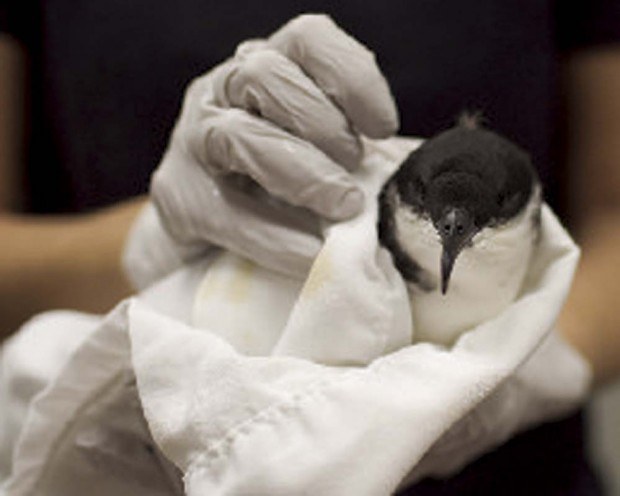LIHU‘E — The U.S. Fish and Wildlife Service has given Kaua‘i Island Utility Cooperative a green light to “take” a certain number of endangered seabirds annually so long as the co-op adheres to its federally approved habitat conservation plan. The
LIHU‘E — The U.S. Fish and Wildlife Service has given Kaua‘i Island Utility Cooperative a green light to “take” a certain number of endangered seabirds annually so long as the co-op adheres to its federally approved habitat conservation plan.
The permit protects the co-op from fines and prosecution when Newell’s shearwaters or Hawaiian petrels are injured or killed after flying into power lines or becoming disoriented by street lights. The plan requires the co-op to implement particular precautionary measures.
But the federal permit may not be valid until the state approves an incidental take license, which is pending before the Department of Land and Natural Resources.
“KIUC remains in violation of both federal and state endangered species laws and is not authorized to harm any protected species until it has both permits,” Earthjustice attorney David Henkin said Monday in a news release representing several conservation groups.
The co-op is researching that question, KIUC spokeswoman Anne Barnes said Monday when asked about the discrepancy.
The federal permit requires KIUC to carry out actions described in the habitat conservation plan, according to the conservation groups. These include a schedule for KIUC to lower its power lines, obscure them with fast-growing trees, or attach them to bridges to minimize bird fatalities in key flyways — Kealia, Hanapepe and Kapa‘a.
“We’ve been asking KIUC to implement these common sense protective measures for years, but the utility refused,” said Peter Galvin of the Center for Biological Diversity. “It’s gratifying to see they are finally being required under the HCP.”
The HCP further directs KIUC to fund nesting colony protection and restoration efforts at Limahuli and Hono o Na Pali to help offset the bird deaths caused by its operations, the conservation groups said in the release.
According to KIUC, the co-op has for years worked collaboratively with the U.S. Fish and Wildlife Service and state DLNR Division of Forestry and Wildlife “to address complex issues concerning the potential impact of utility structures and lights on Kaua‘i’s protected and endangered seabirds and has implemented numerous measures to reduce the potential impacts of its facilities on seabirds (such as shielding thousands of streetlights, shielding facility lighting, altering powerlines, etc.) and to assist seabird survival and recovery (such as funding, expanding and improving the Save Our Shearwaters program, and funding habitat improvement projects).”
Earthjustice, a non-profit environmental law firm, filed a lawsuit against the co-op in March 2010 on behalf of Hui Ho‘omalu I Ka ‘Aina, Conservation Council for Hawai‘i, Center for Biological Diversity and American Bird Conservancy.
After being indicted for criminal violations of the Endangered Species Act, KIUC settled the case with the U.S. Justice Department in May 2010.
“It’s unfortunate that two lawsuits were needed to get KIUC to take responsibility for its actions,” said Marjorie Ziegler of Conservation Council for Hawai‘i. “Corporations operating in Hawai‘i should understand their kuleana (responsibility) to protect our precious natural heritage.”
From 1993 to 2008, the population of Newell’s shearwaters on Kaua‘i declined by 75 percent, according to the release from the conservation groups.
“This is an important step in protecting the increasingly rare, native seabirds that nest on Kaua‘i,” said Maka‘ala Ka‘aumoana of Hui Ho‘omalu I Ka ‘Aina. “We regret only that KIUC has taken so long to do something meaningful about the nearly 200 endangered and threatened seabirds its power lines and streetlights kill and injure each year.”
The permit authorizes take of the federally endangered Hawaiian petrel and the threatened Newell’s shearwater. Take of the band-rumped storm petrel, a candidate species for listing under the ESA, is also authorized under the permit should this species be listed during the five-year term of the permit, according to KIUC.
“KIUC will continue to take its responsibility for seabirds very seriously,” KIUC President and CEO David Bissell said in the release. “We have spent more than $4 million in minimization and mitigation projects, working with consultants, attorneys, community groups, wildlife agencies, and government regulators on bird issues. KIUC commits an additional $11 million over the five-year term of this Short-Term HCP, and will continue its role as a leader in research, protection and conservation of the islands’ natural resources.”
The timeline for the state permit is unknown at present, Barnes said.
“The Department of Land and Natural Resources has told KIUC to conduct an environmental assessment as part of the process, but the utility has refused to comply,” the conservation groups’ release states.
The two news releases issued Monday from the conservation groups and KIUC on FWS’s decision to grant the permit Friday and sign off on the habitat conservation plan are telling.
The conservation groups, for instance, underscore the pending state permit.
“Unfortunately, KIUC is still dragging its feet at the state level,” said George Wallace of American Bird Conservancy. “It’s not over yet, but the issuance of a federal permit represents a hard-fought effort by the conservation community to hold KIUC accountable.”
KIUC’s release, on the other hand, mentions little about the co-op’s ongoing effort to secure an incidental take license from the state.
“The completion of the Short-Term HCP and issuance of incidental take authorization was an important step in obtaining a clear direction from the federal agency on where KIUC should be investing its member’s (sic) money in order to minimize and mitigate potential impacts of our facilities on the endangered and threatened seabirds that exist on Kaua‘i,” said Carey Koide, KIUC support services manager, who is in charge of KIUC seabird mitigation efforts.


